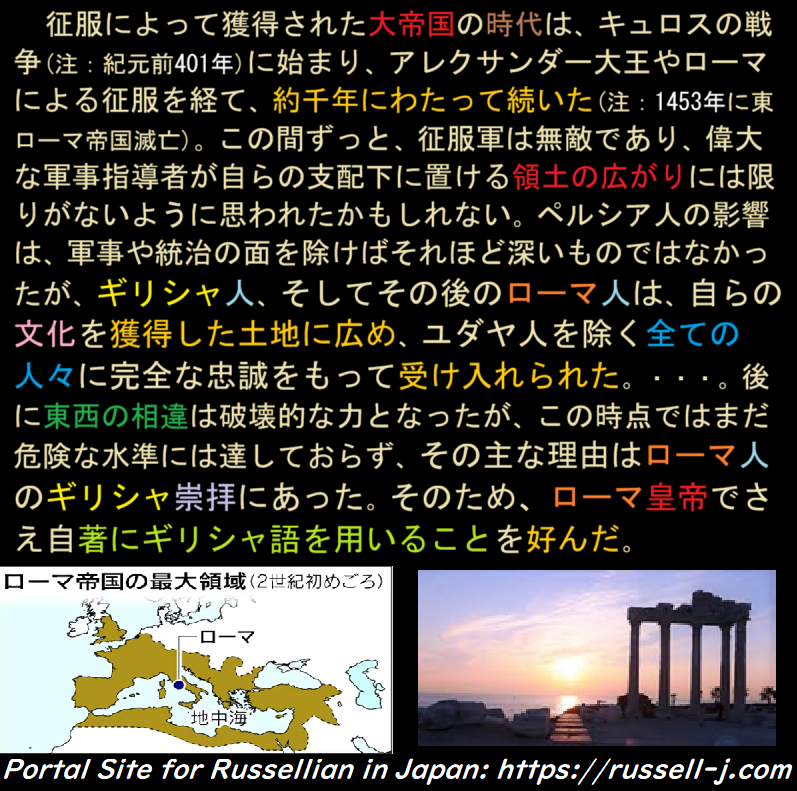
征服によって獲得された大帝国の時代は、キュロスの戦争(注:紀元前401年)に始まり、アレクサンダー大王やローマによる征服を経て、約千年にわたって続いた(注:1453年に東ローマ帝国滅亡)。この間ずっと、征服軍は無敵であり、偉大な軍事指導者が自らの支配下に置ける領土の広がりには限りがないように思われたかもしれない。ペルシア人の影響は、軍事や統治の面を除けばそれほど深いものではなかったが、ギリシャ人、そしてその後のローマ人は、自らの文化を獲得した土地に広め、ユダヤ人を除くすべての人々に完全な忠誠をもって受け入れられた。・・・。後に東西の相違(division)は破壊的な力となったが、この時点ではまだ危険な水準には達しておらず、その主な理由はローマ人のギリシャ崇拝にあった。そのため、ローマ皇帝でさえ自著にギリシャ語を用いることを好んだ。
The period of great empires acquired by conquest begins with the wars of Cyrus and continues through the conquests of Alexander and of Rome, through a period of about a thousand years. Throughout this time, it might have seemed that conquering armies were irresistible and that there was no limit to the extent of territory that a great military leader could bring under his sway. The impact of the Persians in other than military and governmental matters was not very profound, but first the Greeks and then the Romans spread their culture throughout the lands that they acquired, and were accepted with full loyalty by all except the Jews. ... The division of East and West, which soon afterwards became a disruptive force, had not yet developed to a dangerous point, chiefly because of the Roman admiration for the Greeks, which caused even a Roman Emperor to prefer the Greek language in his books.
Source: Bertrand Russell: Human Society in Ethics and Politics, 1954, part II: The Conflict of Passions, chapter 5: Cohesion and Rivalry, n.3
More info.: https://russell-j.com/cool/47T-2_0503.htm
<寸言>
「ギリシャ人、そしてその後のローマ人は、自らの文化を獲得した土地に広め、ユダヤ人を除くすべての人々に完全な忠誠をもって受け入れられた。」というラッセルの記述の中の「ユダヤ人を除く(ユダヤ人を除いて)」という言葉が印象的です。
ユダヤ民族の他の民族との違いが際立っており、一神教であるユダヤ教を熱心に信じる現在のイスラエルに通じているように思われます。
ところで、「The division of East and West」は「ローマ帝国の東西の相違」を指しているのか、それとも「西暦395年の西ローマ帝国と東ローマ帝国」への分割を指しているのか、疑問を持つ方がいるのではないでしょうか? そこで、ChatGPTと対話したところ、ChatGPTも私と同様に、「ラッセルが"まだ決定的な分裂には至っていなかった"と述べていることを考えると、395年の帝国の分割そのものではなく、それに先行する東西の文化的・政治的な違いを指していると解釈するのが妥当ではないかと思われます。」と解釈しています。
なお、「ローマ皇帝でさえ自著にギリシャ語を用いることを好んだ」というのは、『自省録(Meditations』をギリシャ語で執筆したマルクス・アウレリウスのことを言っていると思われます。
Russell's statement, "the Greeks and then the Romans spread their culture throughout the lands that they acquired, and were accepted with full loyalty by all except the Jews." is striking, particularly in its mention of "except the Jews."
This highlights the distinctiveness of the Jewish people from other nations, and it seems to resonate with modern Israel, where Judaism, as a monotheistic faith, is fervently observed.
Meanwhile, some may wonder whether "The division of East and West" refers to the cultural and political differences within the Roman Empire or to its formal division into the Western and Eastern Roman Empires in 395 AD. In my discussion with ChatGPT, it concurred with my view that, considering Russell's remark that "it had not yet developed to a dangerous point", it is more reasonable to interpret this phrase as referring to the cultural and political distinctions preceding the actual division, rather than to the formal partition itself.
Additionally, the phrase "even a Roman Emperor preferred to use the Greek language in his books" likely refers to Marcus Aurelius, who wrote Meditations in Greek.
* Amazon Gift Card
